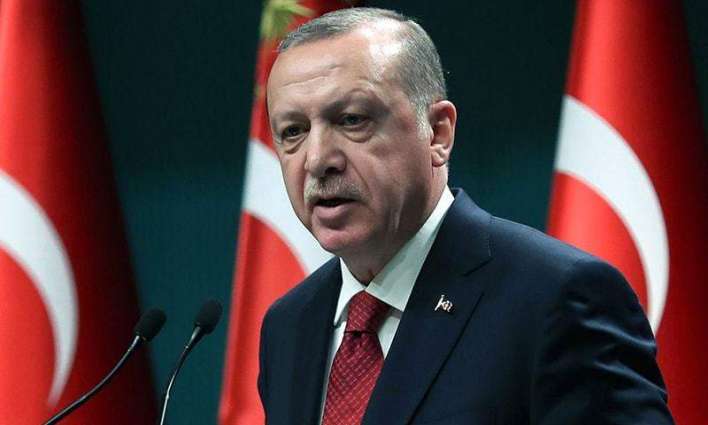Turkey's ability to straddle the fence by making overtures to both sides of the ongoing hostilities in Ukraine and not joining the broad anti-Russian sanctions may be exhausted with the conflict worsening and Western unity holding, international experts said during a Thursday online event on the conflict
ST. PETERSBURG (Pakistan Point News / Sputnik - 14th April, 2022) Turkey's ability to straddle the fence by making overtures to both sides of the ongoing hostilities in Ukraine and not joining the broad anti-Russian sanctions may be exhausted with the conflict worsening and Western unity holding, international experts said during a Thursday online event on the conflict.
On the first day of the conflict, Turkish President Recep Tayyip Erdogan labeled the Russian special operation in Ukraine as "unacceptable" and "contrary to international law", reiterating solid commitments to Ukraine's sovereignty and territorial integrity. At the same time, he called on both Russia and Ukraine to find a diplomatic solution.
Over the past month, Ankara has continued to act as a facilitator between the two nations, calling on both sides for a ceasefire and the opening of humanitarian corridors, as well as offering to host peace negotiations. Ankara also chose not to impose unilateral sanctions against Russia, realizing that they can damage the bilateral ties and devastate the country's economy.
At the same time, Turkey is continuing to supply both humanitarian assistance and military equipment to Ukraine. In March, it also decided to invoke the 1936 Montreux Convention, which allows Ankara to regulate the passage of warships through the Bosporus and Dardanelles straits. This was done for the first time since World War II.
Professor of international relations and Jean Monnet chair ad personam at Sabanci University in Istanbul, Meltem Muftuler-Bac, emphasized in her speech that Turkey found itself in a very delicate position due to the level of interdependence that it has with Moscow on the one hand, and very good relations with Kiev on the other.
"Therefore, it had to be very careful and to plan for a very thought-through response. At the same time, it had to send a strong signal to Russia with regards to Ukrainian sovereignty and its territorial integrity," she said.
The professor believes that Turkey will attempt to balance its strategy without picking sides between Kiev and Moscow for as long as it can. She questioned, however, whether it will prove to be a long-term strategy.
Her colleague, Vice President of the German Marshall Fund Ian Lesser, agreed that Turkey is in a very delicate position for the reasons described, suggesting that Ankara is a full stakeholder in this crisis owing to security in the Black Sea and Turkey's relations with both countries.
"Turkey tried to have an equal distance from both sides but I don't think that it is realistic for a number of reasons. You can't have it both ways... There will be a deepening confrontation between NATO and Russia, and Turkey is highly exposed, it seems to me. Turkey has multiple places where it can get in trouble with Russia. Just imagine if the 2015 downing of the Russian aircraft taking place today under these conditions," he said.
Lesser added that "there are a lot of places where Russia and Turkey can get in trouble even accidentally and that would have serious implications."
INDEPENDENT FROM NATO BUT NOT FOR LONG
The experts have also agreed that in the long term, when Turkey might require NATO help for its own defense, the issue of Turkey avoiding sanctions on Russia would become critical.
"There are a lot of reasons why Turkey should be seeking ways to restore its credibility with the western partners. The dilemma for Turkey will get tougher and tougher as time goes on... Turkey, for example, wants to have access to upgraded F-16s from the United States, apart from getting back into the F-35 program. I can't imagine that happening if in Congress there would be questions about Turkey's getting around sanctions on Russia and potentially actively allowing Russia to avoid them," Lesser said.
The expert also pointed out that Turkey, in a way, is "allergic" to sanctions due to its own historical experience and tends to justify its stance by citing the ineffectiveness of sanctions. However, according to Lesser, Brussels or Washington might find it harder to justify Turkey's attempt to get around sanctions as time goes by.
Luigi Scazzieri, a senior research fellow in the Center for European Reform, noted that the Ukrainian conflict came at a time when Turkey-EU relations were improving on all tracks after the high tensions of 2020.
"I think these developments had improved Turkey's image in the EU, besides Ankara's mediation efforts and military support for Ukraine were appreciated as well. So far, Turkey hasn't come under substantial pressure from its allies. The question is for how long this would last," Scazzieri said, adding that, ideally, Europe would like to see from Turkey an alignment with sanctions in the future.
Turkey's ability to preserve independence despite NATO membership is highly valued by Russia as well. Kremlin spokesman Dmitry Peskov said earlier this month that Turkey is a country that can afford the luxury of saying to Brussels and Washington that it will not join the sanctions and that Russia appreciates it.
Peskov stressed that Turkey remains a strong regional power, while noting that Ankara's relations with Moscow may have disagreements, but partnership prevails.




